Sociology 2: Power, Surveillance, and Stigma in Social Care Ethics
VerifiedAdded on 2023/01/17
|7
|1845
|93
Essay
AI Summary
This essay delves into the sociological definitions of power, particularly focusing on the concepts of surveillance and stigma within social care settings. It examines how power dynamics can be misused by social care practitioners, referencing institutional inquiries and scandals as examples. The essay also provides practice recommendations aimed at rebalancing the power dynamic between practitioners and service users, emphasizing the importance of ethical conduct and the need for social care workers to act in the best interest of the service user. The discussion incorporates the perspectives of Goffman and Foucault on power, surveillance, and stigma, providing a comprehensive analysis of their relevance to social care practice. This resource is available on Desklib, offering valuable insights for students and professionals in the field.
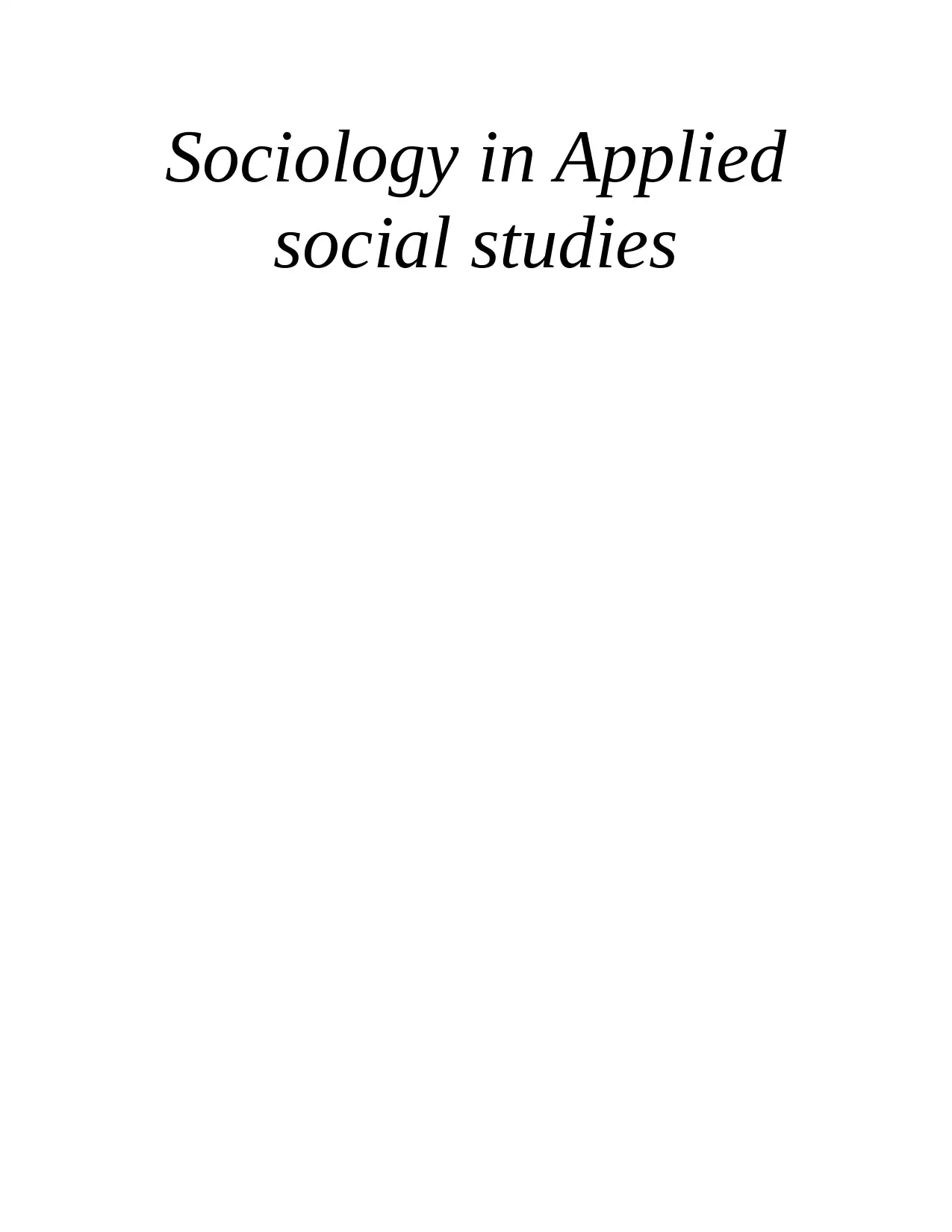
Sociology in Applied
social studies
social studies
Paraphrase This Document
Need a fresh take? Get an instant paraphrase of this document with our AI Paraphraser
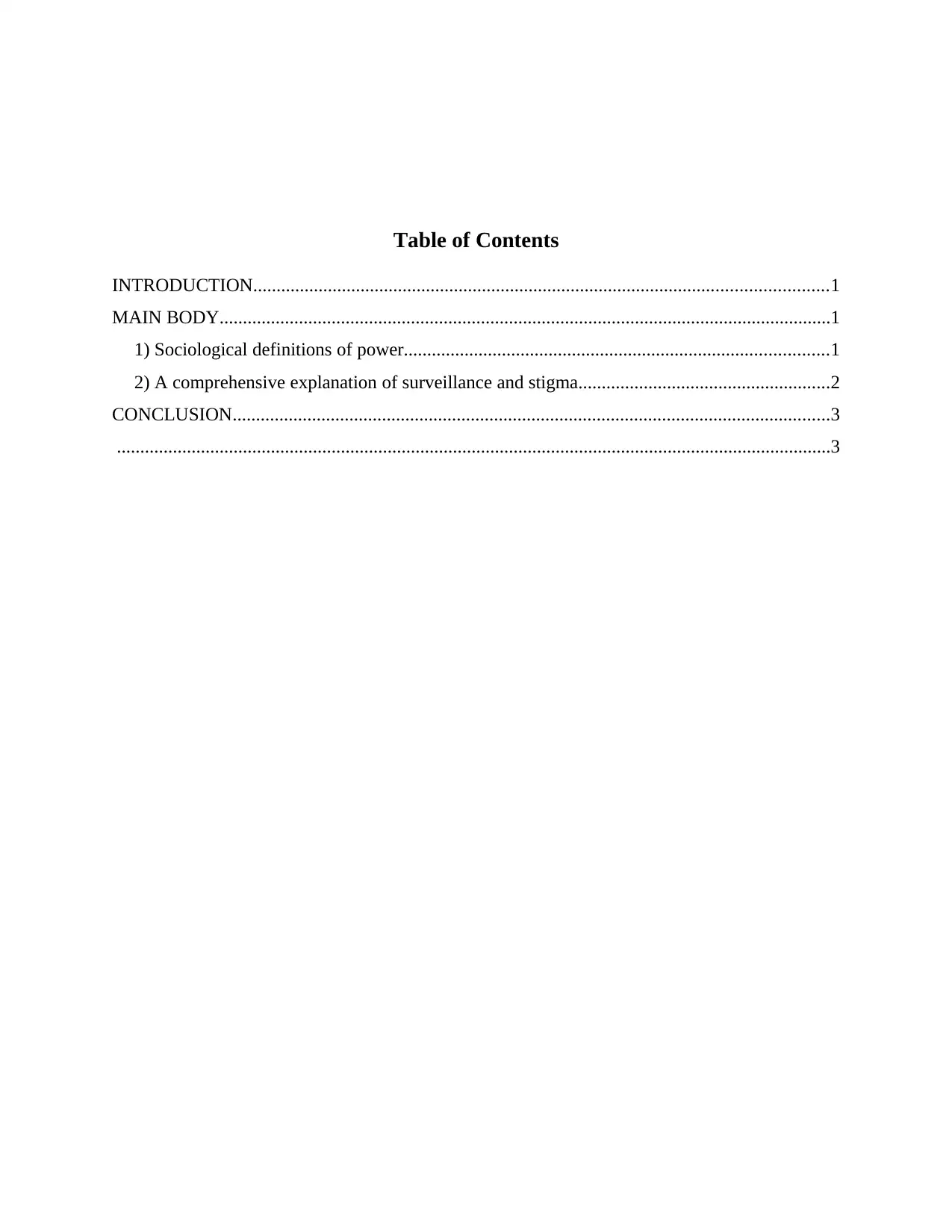
Table of Contents
INTRODUCTION...........................................................................................................................1
MAIN BODY...................................................................................................................................1
1) Sociological definitions of power...........................................................................................1
2) A comprehensive explanation of surveillance and stigma......................................................2
CONCLUSION................................................................................................................................3
.........................................................................................................................................................3
INTRODUCTION...........................................................................................................................1
MAIN BODY...................................................................................................................................1
1) Sociological definitions of power...........................................................................................1
2) A comprehensive explanation of surveillance and stigma......................................................2
CONCLUSION................................................................................................................................3
.........................................................................................................................................................3
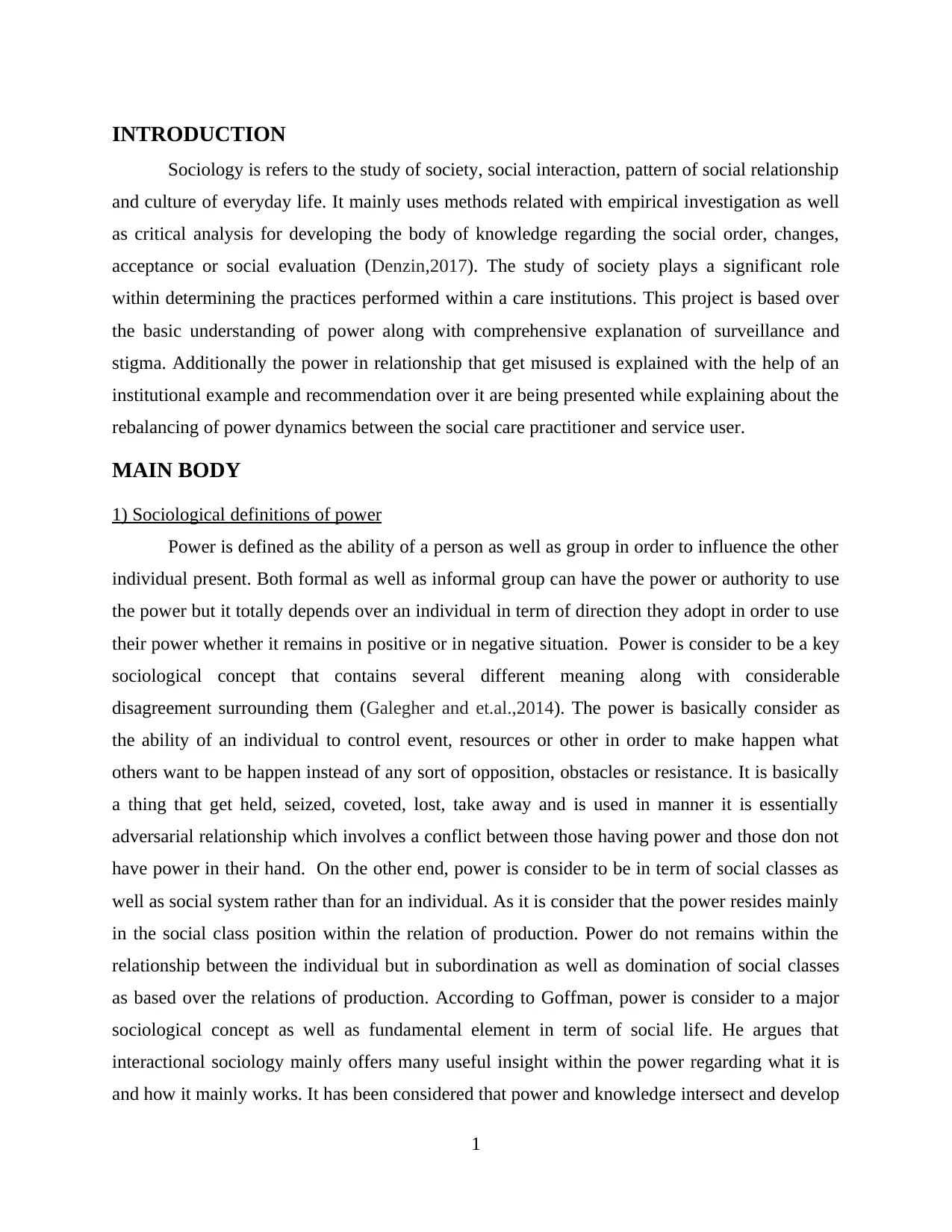
INTRODUCTION
Sociology is refers to the study of society, social interaction, pattern of social relationship
and culture of everyday life. It mainly uses methods related with empirical investigation as well
as critical analysis for developing the body of knowledge regarding the social order, changes,
acceptance or social evaluation (Denzin,2017). The study of society plays a significant role
within determining the practices performed within a care institutions. This project is based over
the basic understanding of power along with comprehensive explanation of surveillance and
stigma. Additionally the power in relationship that get misused is explained with the help of an
institutional example and recommendation over it are being presented while explaining about the
rebalancing of power dynamics between the social care practitioner and service user.
MAIN BODY
1) Sociological definitions of power
Power is defined as the ability of a person as well as group in order to influence the other
individual present. Both formal as well as informal group can have the power or authority to use
the power but it totally depends over an individual in term of direction they adopt in order to use
their power whether it remains in positive or in negative situation. Power is consider to be a key
sociological concept that contains several different meaning along with considerable
disagreement surrounding them (Galegher and et.al.,2014). The power is basically consider as
the ability of an individual to control event, resources or other in order to make happen what
others want to be happen instead of any sort of opposition, obstacles or resistance. It is basically
a thing that get held, seized, coveted, lost, take away and is used in manner it is essentially
adversarial relationship which involves a conflict between those having power and those don not
have power in their hand. On the other end, power is consider to be in term of social classes as
well as social system rather than for an individual. As it is consider that the power resides mainly
in the social class position within the relation of production. Power do not remains within the
relationship between the individual but in subordination as well as domination of social classes
as based over the relations of production. According to Goffman, power is consider to a major
sociological concept as well as fundamental element in term of social life. He argues that
interactional sociology mainly offers many useful insight within the power regarding what it is
and how it mainly works. It has been considered that power and knowledge intersect and develop
1
Sociology is refers to the study of society, social interaction, pattern of social relationship
and culture of everyday life. It mainly uses methods related with empirical investigation as well
as critical analysis for developing the body of knowledge regarding the social order, changes,
acceptance or social evaluation (Denzin,2017). The study of society plays a significant role
within determining the practices performed within a care institutions. This project is based over
the basic understanding of power along with comprehensive explanation of surveillance and
stigma. Additionally the power in relationship that get misused is explained with the help of an
institutional example and recommendation over it are being presented while explaining about the
rebalancing of power dynamics between the social care practitioner and service user.
MAIN BODY
1) Sociological definitions of power
Power is defined as the ability of a person as well as group in order to influence the other
individual present. Both formal as well as informal group can have the power or authority to use
the power but it totally depends over an individual in term of direction they adopt in order to use
their power whether it remains in positive or in negative situation. Power is consider to be a key
sociological concept that contains several different meaning along with considerable
disagreement surrounding them (Galegher and et.al.,2014). The power is basically consider as
the ability of an individual to control event, resources or other in order to make happen what
others want to be happen instead of any sort of opposition, obstacles or resistance. It is basically
a thing that get held, seized, coveted, lost, take away and is used in manner it is essentially
adversarial relationship which involves a conflict between those having power and those don not
have power in their hand. On the other end, power is consider to be in term of social classes as
well as social system rather than for an individual. As it is consider that the power resides mainly
in the social class position within the relation of production. Power do not remains within the
relationship between the individual but in subordination as well as domination of social classes
as based over the relations of production. According to Goffman, power is consider to a major
sociological concept as well as fundamental element in term of social life. He argues that
interactional sociology mainly offers many useful insight within the power regarding what it is
and how it mainly works. It has been considered that power and knowledge intersect and develop
1
⊘ This is a preview!⊘
Do you want full access?
Subscribe today to unlock all pages.

Trusted by 1+ million students worldwide
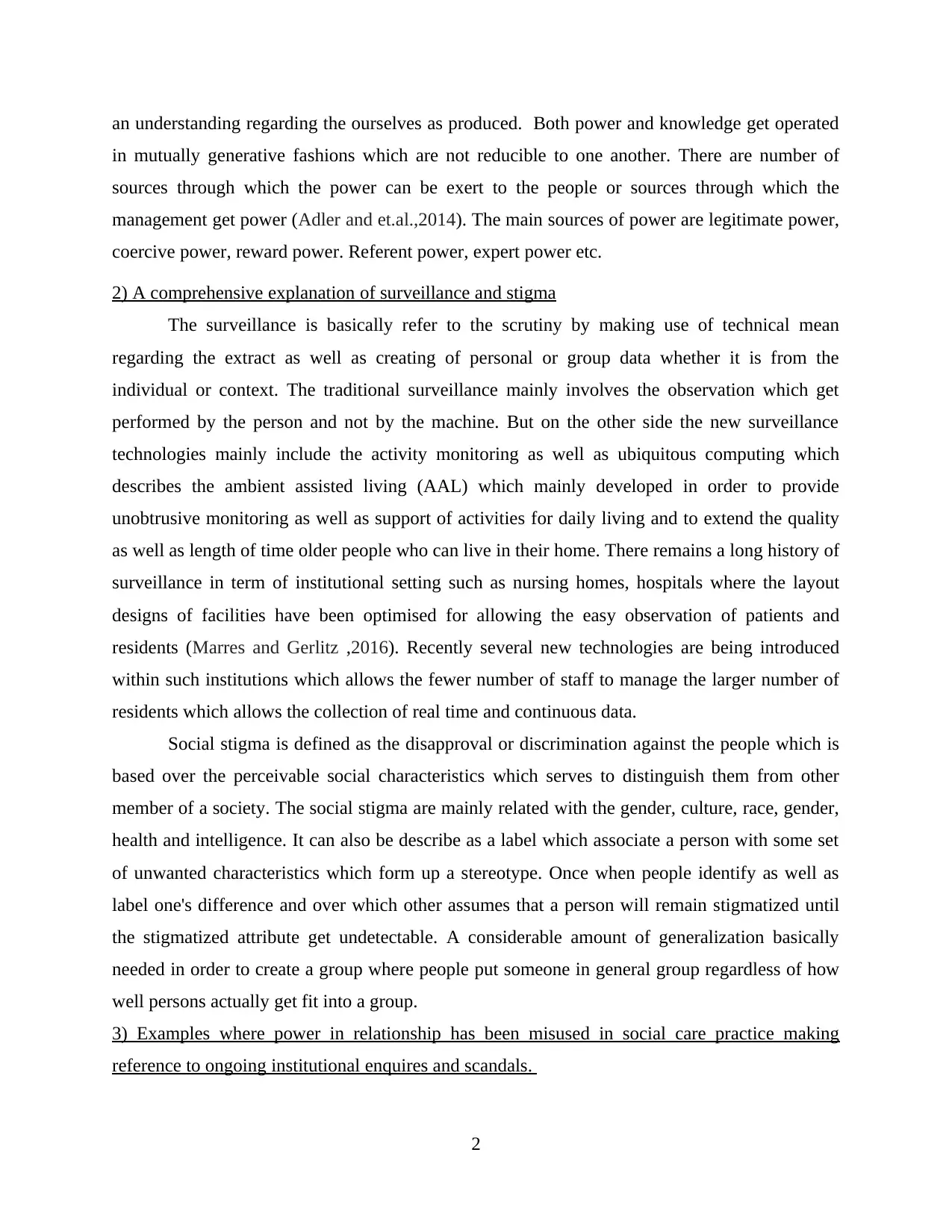
an understanding regarding the ourselves as produced. Both power and knowledge get operated
in mutually generative fashions which are not reducible to one another. There are number of
sources through which the power can be exert to the people or sources through which the
management get power (Adler and et.al.,2014). The main sources of power are legitimate power,
coercive power, reward power. Referent power, expert power etc.
2) A comprehensive explanation of surveillance and stigma
The surveillance is basically refer to the scrutiny by making use of technical mean
regarding the extract as well as creating of personal or group data whether it is from the
individual or context. The traditional surveillance mainly involves the observation which get
performed by the person and not by the machine. But on the other side the new surveillance
technologies mainly include the activity monitoring as well as ubiquitous computing which
describes the ambient assisted living (AAL) which mainly developed in order to provide
unobtrusive monitoring as well as support of activities for daily living and to extend the quality
as well as length of time older people who can live in their home. There remains a long history of
surveillance in term of institutional setting such as nursing homes, hospitals where the layout
designs of facilities have been optimised for allowing the easy observation of patients and
residents (Marres and Gerlitz ,2016). Recently several new technologies are being introduced
within such institutions which allows the fewer number of staff to manage the larger number of
residents which allows the collection of real time and continuous data.
Social stigma is defined as the disapproval or discrimination against the people which is
based over the perceivable social characteristics which serves to distinguish them from other
member of a society. The social stigma are mainly related with the gender, culture, race, gender,
health and intelligence. It can also be describe as a label which associate a person with some set
of unwanted characteristics which form up a stereotype. Once when people identify as well as
label one's difference and over which other assumes that a person will remain stigmatized until
the stigmatized attribute get undetectable. A considerable amount of generalization basically
needed in order to create a group where people put someone in general group regardless of how
well persons actually get fit into a group.
3) Examples where power in relationship has been misused in social care practice making
reference to ongoing institutional enquires and scandals.
2
in mutually generative fashions which are not reducible to one another. There are number of
sources through which the power can be exert to the people or sources through which the
management get power (Adler and et.al.,2014). The main sources of power are legitimate power,
coercive power, reward power. Referent power, expert power etc.
2) A comprehensive explanation of surveillance and stigma
The surveillance is basically refer to the scrutiny by making use of technical mean
regarding the extract as well as creating of personal or group data whether it is from the
individual or context. The traditional surveillance mainly involves the observation which get
performed by the person and not by the machine. But on the other side the new surveillance
technologies mainly include the activity monitoring as well as ubiquitous computing which
describes the ambient assisted living (AAL) which mainly developed in order to provide
unobtrusive monitoring as well as support of activities for daily living and to extend the quality
as well as length of time older people who can live in their home. There remains a long history of
surveillance in term of institutional setting such as nursing homes, hospitals where the layout
designs of facilities have been optimised for allowing the easy observation of patients and
residents (Marres and Gerlitz ,2016). Recently several new technologies are being introduced
within such institutions which allows the fewer number of staff to manage the larger number of
residents which allows the collection of real time and continuous data.
Social stigma is defined as the disapproval or discrimination against the people which is
based over the perceivable social characteristics which serves to distinguish them from other
member of a society. The social stigma are mainly related with the gender, culture, race, gender,
health and intelligence. It can also be describe as a label which associate a person with some set
of unwanted characteristics which form up a stereotype. Once when people identify as well as
label one's difference and over which other assumes that a person will remain stigmatized until
the stigmatized attribute get undetectable. A considerable amount of generalization basically
needed in order to create a group where people put someone in general group regardless of how
well persons actually get fit into a group.
3) Examples where power in relationship has been misused in social care practice making
reference to ongoing institutional enquires and scandals.
2
Paraphrase This Document
Need a fresh take? Get an instant paraphrase of this document with our AI Paraphraser
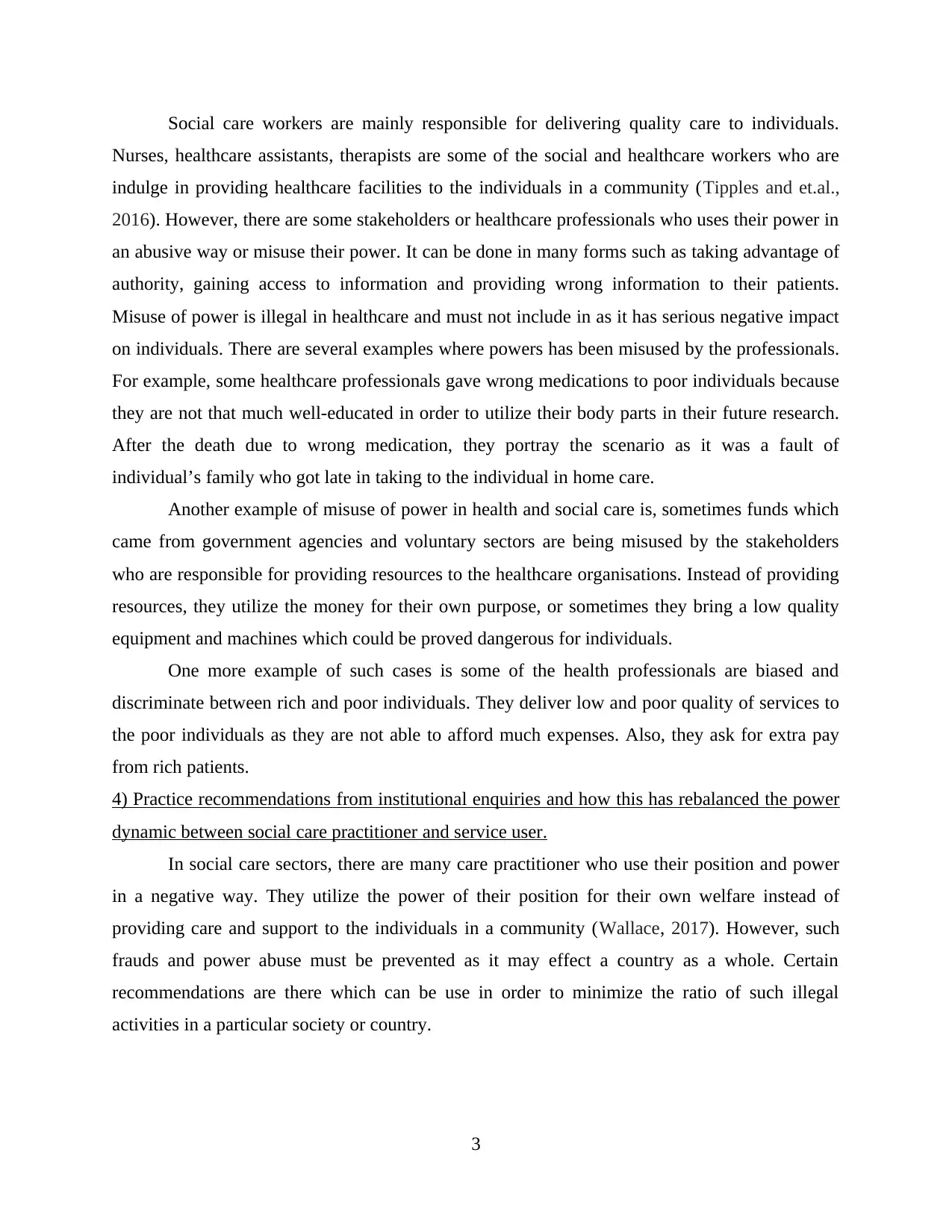
Social care workers are mainly responsible for delivering quality care to individuals.
Nurses, healthcare assistants, therapists are some of the social and healthcare workers who are
indulge in providing healthcare facilities to the individuals in a community (Tipples and et.al.,
2016). However, there are some stakeholders or healthcare professionals who uses their power in
an abusive way or misuse their power. It can be done in many forms such as taking advantage of
authority, gaining access to information and providing wrong information to their patients.
Misuse of power is illegal in healthcare and must not include in as it has serious negative impact
on individuals. There are several examples where powers has been misused by the professionals.
For example, some healthcare professionals gave wrong medications to poor individuals because
they are not that much well-educated in order to utilize their body parts in their future research.
After the death due to wrong medication, they portray the scenario as it was a fault of
individual’s family who got late in taking to the individual in home care.
Another example of misuse of power in health and social care is, sometimes funds which
came from government agencies and voluntary sectors are being misused by the stakeholders
who are responsible for providing resources to the healthcare organisations. Instead of providing
resources, they utilize the money for their own purpose, or sometimes they bring a low quality
equipment and machines which could be proved dangerous for individuals.
One more example of such cases is some of the health professionals are biased and
discriminate between rich and poor individuals. They deliver low and poor quality of services to
the poor individuals as they are not able to afford much expenses. Also, they ask for extra pay
from rich patients.
4) Practice recommendations from institutional enquiries and how this has rebalanced the power
dynamic between social care practitioner and service user.
In social care sectors, there are many care practitioner who use their position and power
in a negative way. They utilize the power of their position for their own welfare instead of
providing care and support to the individuals in a community (Wallace, 2017). However, such
frauds and power abuse must be prevented as it may effect a country as a whole. Certain
recommendations are there which can be use in order to minimize the ratio of such illegal
activities in a particular society or country.
3
Nurses, healthcare assistants, therapists are some of the social and healthcare workers who are
indulge in providing healthcare facilities to the individuals in a community (Tipples and et.al.,
2016). However, there are some stakeholders or healthcare professionals who uses their power in
an abusive way or misuse their power. It can be done in many forms such as taking advantage of
authority, gaining access to information and providing wrong information to their patients.
Misuse of power is illegal in healthcare and must not include in as it has serious negative impact
on individuals. There are several examples where powers has been misused by the professionals.
For example, some healthcare professionals gave wrong medications to poor individuals because
they are not that much well-educated in order to utilize their body parts in their future research.
After the death due to wrong medication, they portray the scenario as it was a fault of
individual’s family who got late in taking to the individual in home care.
Another example of misuse of power in health and social care is, sometimes funds which
came from government agencies and voluntary sectors are being misused by the stakeholders
who are responsible for providing resources to the healthcare organisations. Instead of providing
resources, they utilize the money for their own purpose, or sometimes they bring a low quality
equipment and machines which could be proved dangerous for individuals.
One more example of such cases is some of the health professionals are biased and
discriminate between rich and poor individuals. They deliver low and poor quality of services to
the poor individuals as they are not able to afford much expenses. Also, they ask for extra pay
from rich patients.
4) Practice recommendations from institutional enquiries and how this has rebalanced the power
dynamic between social care practitioner and service user.
In social care sectors, there are many care practitioner who use their position and power
in a negative way. They utilize the power of their position for their own welfare instead of
providing care and support to the individuals in a community (Wallace, 2017). However, such
frauds and power abuse must be prevented as it may effect a country as a whole. Certain
recommendations are there which can be use in order to minimize the ratio of such illegal
activities in a particular society or country.
3
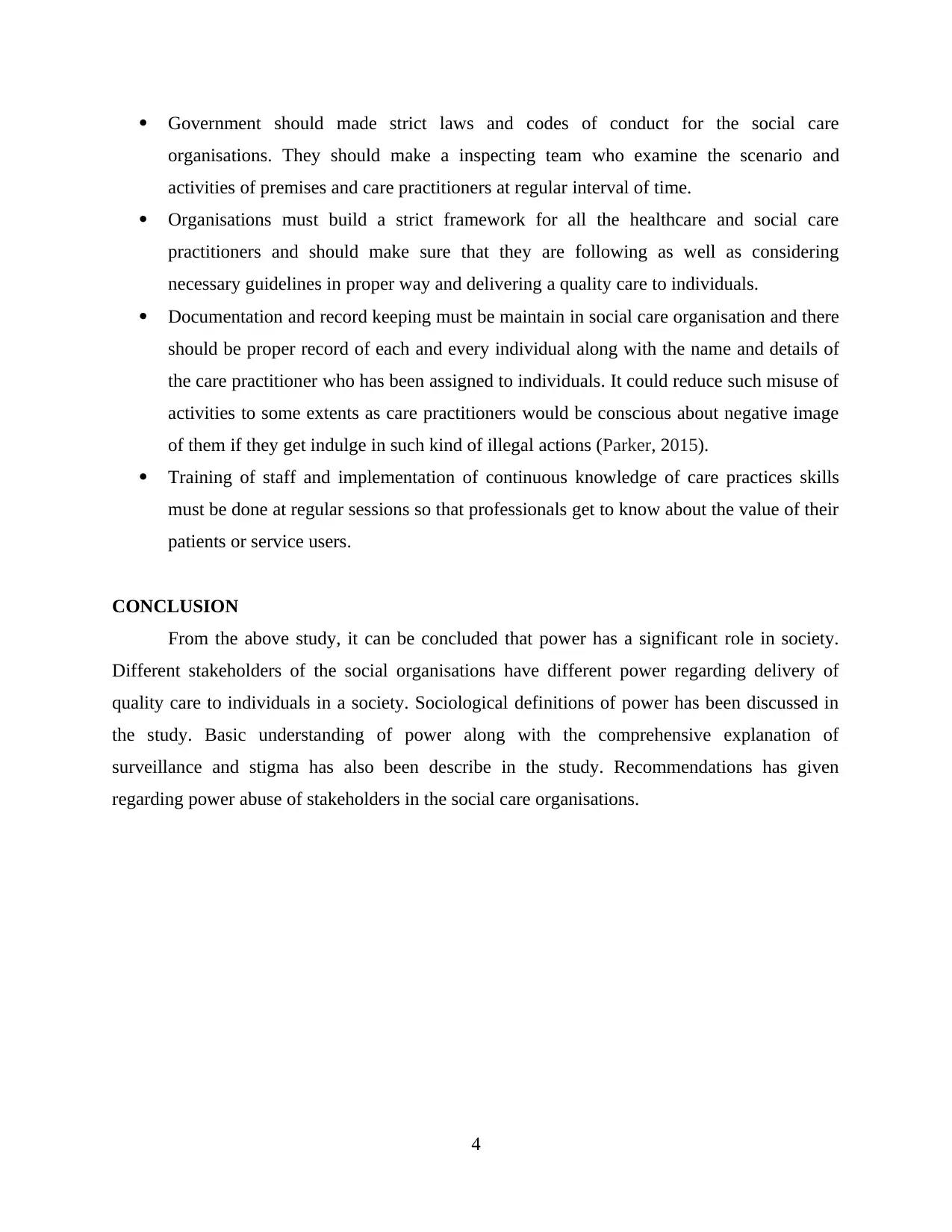
Government should made strict laws and codes of conduct for the social care
organisations. They should make a inspecting team who examine the scenario and
activities of premises and care practitioners at regular interval of time.
Organisations must build a strict framework for all the healthcare and social care
practitioners and should make sure that they are following as well as considering
necessary guidelines in proper way and delivering a quality care to individuals.
Documentation and record keeping must be maintain in social care organisation and there
should be proper record of each and every individual along with the name and details of
the care practitioner who has been assigned to individuals. It could reduce such misuse of
activities to some extents as care practitioners would be conscious about negative image
of them if they get indulge in such kind of illegal actions (Parker, 2015).
Training of staff and implementation of continuous knowledge of care practices skills
must be done at regular sessions so that professionals get to know about the value of their
patients or service users.
CONCLUSION
From the above study, it can be concluded that power has a significant role in society.
Different stakeholders of the social organisations have different power regarding delivery of
quality care to individuals in a society. Sociological definitions of power has been discussed in
the study. Basic understanding of power along with the comprehensive explanation of
surveillance and stigma has also been describe in the study. Recommendations has given
regarding power abuse of stakeholders in the social care organisations.
4
organisations. They should make a inspecting team who examine the scenario and
activities of premises and care practitioners at regular interval of time.
Organisations must build a strict framework for all the healthcare and social care
practitioners and should make sure that they are following as well as considering
necessary guidelines in proper way and delivering a quality care to individuals.
Documentation and record keeping must be maintain in social care organisation and there
should be proper record of each and every individual along with the name and details of
the care practitioner who has been assigned to individuals. It could reduce such misuse of
activities to some extents as care practitioners would be conscious about negative image
of them if they get indulge in such kind of illegal actions (Parker, 2015).
Training of staff and implementation of continuous knowledge of care practices skills
must be done at regular sessions so that professionals get to know about the value of their
patients or service users.
CONCLUSION
From the above study, it can be concluded that power has a significant role in society.
Different stakeholders of the social organisations have different power regarding delivery of
quality care to individuals in a society. Sociological definitions of power has been discussed in
the study. Basic understanding of power along with the comprehensive explanation of
surveillance and stigma has also been describe in the study. Recommendations has given
regarding power abuse of stakeholders in the social care organisations.
4
⊘ This is a preview!⊘
Do you want full access?
Subscribe today to unlock all pages.

Trusted by 1+ million students worldwide
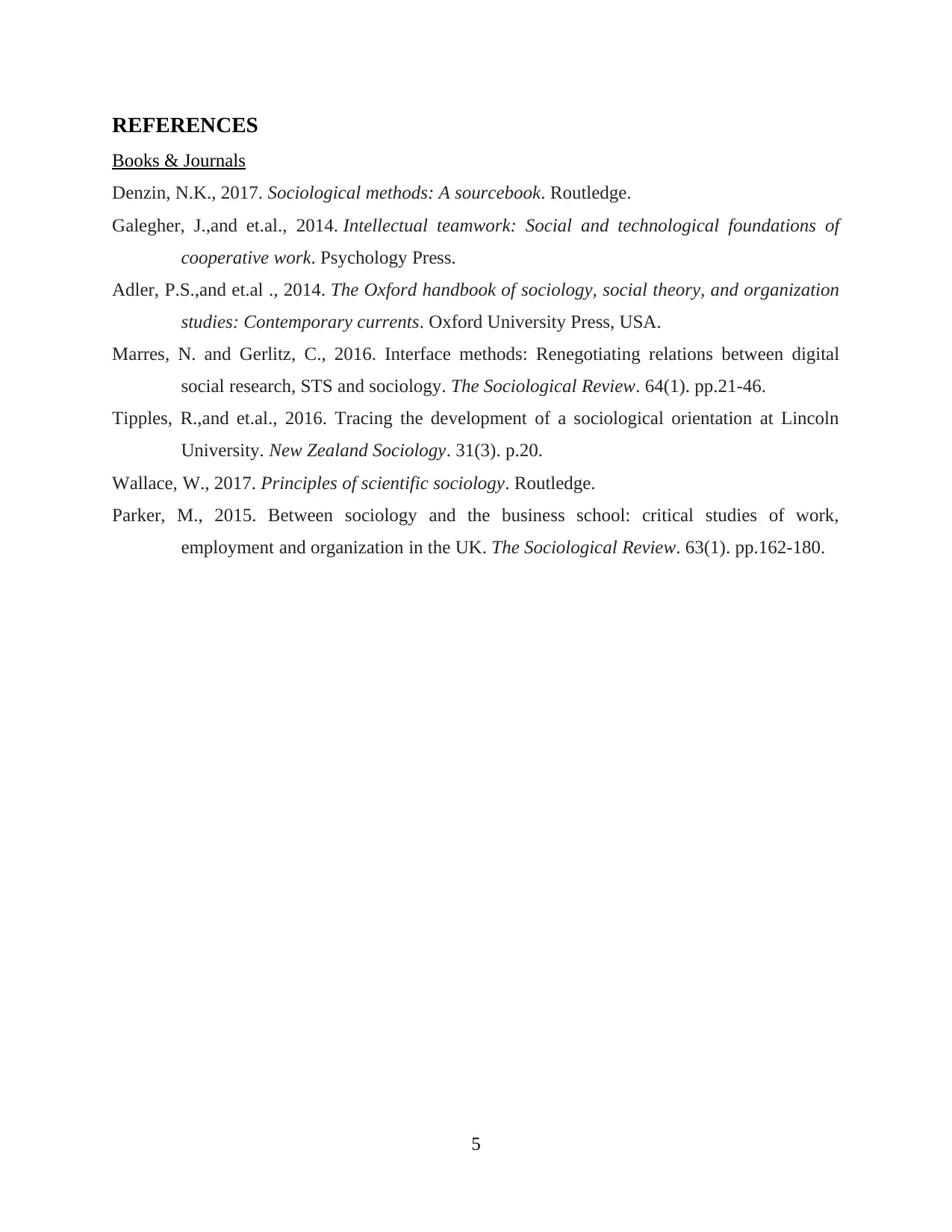
REFERENCES
Books & Journals
Denzin, N.K., 2017. Sociological methods: A sourcebook. Routledge.
Galegher, J.,and et.al., 2014. Intellectual teamwork: Social and technological foundations of
cooperative work. Psychology Press.
Adler, P.S.,and et.al ., 2014. The Oxford handbook of sociology, social theory, and organization
studies: Contemporary currents. Oxford University Press, USA.
Marres, N. and Gerlitz, C., 2016. Interface methods: Renegotiating relations between digital
social research, STS and sociology. The Sociological Review. 64(1). pp.21-46.
Tipples, R.,and et.al., 2016. Tracing the development of a sociological orientation at Lincoln
University. New Zealand Sociology. 31(3). p.20.
Wallace, W., 2017. Principles of scientific sociology. Routledge.
Parker, M., 2015. Between sociology and the business school: critical studies of work,
employment and organization in the UK. The Sociological Review. 63(1). pp.162-180.
5
Books & Journals
Denzin, N.K., 2017. Sociological methods: A sourcebook. Routledge.
Galegher, J.,and et.al., 2014. Intellectual teamwork: Social and technological foundations of
cooperative work. Psychology Press.
Adler, P.S.,and et.al ., 2014. The Oxford handbook of sociology, social theory, and organization
studies: Contemporary currents. Oxford University Press, USA.
Marres, N. and Gerlitz, C., 2016. Interface methods: Renegotiating relations between digital
social research, STS and sociology. The Sociological Review. 64(1). pp.21-46.
Tipples, R.,and et.al., 2016. Tracing the development of a sociological orientation at Lincoln
University. New Zealand Sociology. 31(3). p.20.
Wallace, W., 2017. Principles of scientific sociology. Routledge.
Parker, M., 2015. Between sociology and the business school: critical studies of work,
employment and organization in the UK. The Sociological Review. 63(1). pp.162-180.
5
1 out of 7
Related Documents
Your All-in-One AI-Powered Toolkit for Academic Success.
+13062052269
info@desklib.com
Available 24*7 on WhatsApp / Email
![[object Object]](/_next/static/media/star-bottom.7253800d.svg)
Unlock your academic potential
Copyright © 2020–2025 A2Z Services. All Rights Reserved. Developed and managed by ZUCOL.





